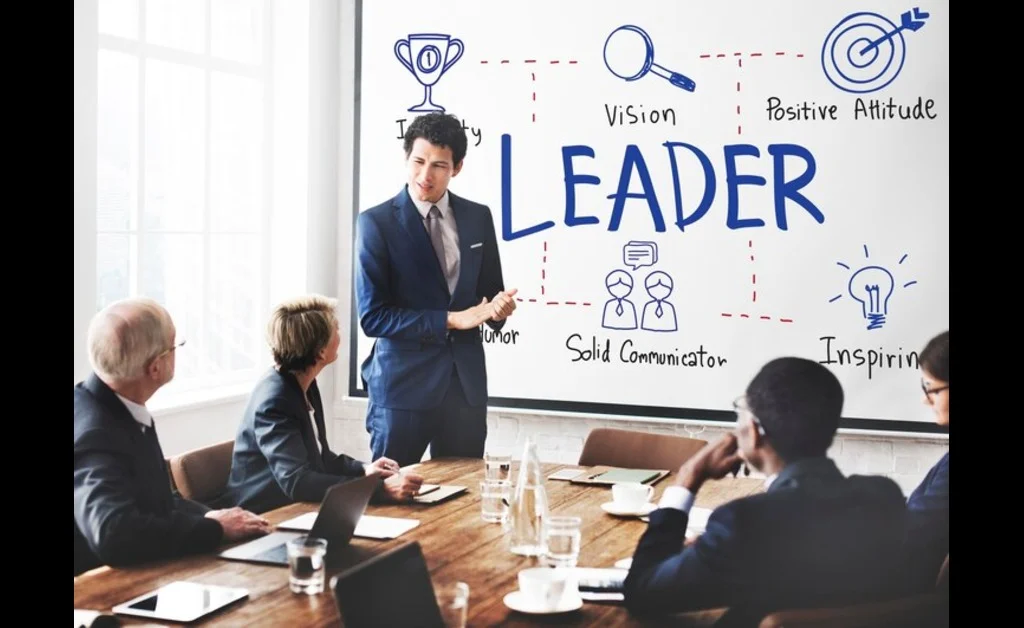10 Powerful Ways Leaders Develop Themselves
Effective leadership is not just about leading others; it’s also about continuous self-improvement and personal growth. As leaders, your ability to develop yourself directly impacts your effectiveness, decision-making skills, and credibility within your team and organization.
Throughout my career as a leadership coach and consultant, I’ve witnessed firsthand the transformative power of self-development. Leaders who prioritize their own growth not only become better versions of themselves but also inspire and empower those around them.
In this comprehensive guide, we’ll explore 10 powerful strategies that enable leaders to develop themselves, foster self-awareness, and cultivate the skills and mindset necessary for exceptional leadership.
1. Embrace a Growth Mindset
One of the fundamental keys to self-development is embracing a growth mindset. A growth mindset is the belief that abilities and intelligence can be developed through dedication and hard work. Leaders with a growth mindset understand that challenges are opportunities for growth, not obstacles to be feared.

To cultivate a growth mindset, leaders must:
- Embrace Challenges: Instead of shying away from difficult tasks, view them as opportunities to learn and grow.
- Seek Feedback: Actively seek feedback from team members, peers, and superiors, and use it as a catalyst for improvement.
- Celebrate Failures: Reframe failures as learning experiences and celebrate the lessons learned.
By adopting a growth mindset, leaders can foster a culture of continuous learning and improvement within their teams and organizations.
2. Continuous Learning and Professional Development
In today’s rapidly evolving business landscape, continuous learning and professional development are essential for leaders to stay relevant and effective. Investing in personal and professional growth opportunities, such as workshops, courses, certifications, and industry events, can help leaders acquire new skills, stay up-to-date with trends, and gain fresh perspectives.

Here are some strategies for continuous learning and professional development:
- Invest in Education: Pursue formal education opportunities, such as executive education programs, online courses, or advanced degrees, to deepen your knowledge and expertise.
- Attend Conferences and Seminars: Participate in industry conferences, seminars, and webinars to stay informed about emerging trends, best practices, and innovative ideas.
- Read Widely: Make time to read books, articles, and research papers related to your field, as well as broader topics that can enhance your leadership skills and strategic thinking.
By prioritizing continuous learning and professional development, leaders not only enhance their own capabilities but also set an example for their teams, fostering a culture of growth and adaptability.
3. Seek Feedback and Self-Reflection
Effective self-development requires a deep understanding of one’s strengths, weaknesses, and areas for improvement. Seeking feedback from team members, peers, and superiors can provide valuable insights and perspectives that may not be apparent from self-reflection alone.
Here are some techniques for seeking feedback and self-reflection:
- 360-Degree Feedback: Implement a formal 360-degree feedback process, where you receive feedback from multiple sources, including direct reports, peers, and superiors.
- Journaling: Maintain a leadership journal to record your thoughts, experiences, and reflections, which can help you identify patterns and areas for growth.
- Coaching and Mentoring: Engage with a professional coach or mentor who can provide objective guidance and support your self-development journey.
By regularly seeking feedback and engaging in self-reflection, leaders can gain a deeper understanding of their leadership style, blind spots, and areas for improvement, enabling them to make informed decisions and take purposeful actions towards their personal and professional growth.
4. Develop Emotional Intelligence
Emotional intelligence (EQ) is a critical component of effective leadership. Leaders with high EQ are better equipped to understand and manage their own emotions, as well as those of their team members. Developing emotional intelligence can enhance self-awareness, self-regulation, motivation, empathy, and social skills, all of which contribute to building stronger relationships and managing conflict effectively.

Here are some strategies for developing emotional intelligence:
- Practice Mindfulness: Engage in mindfulness practices, such as meditation or deep breathing exercises, to cultivate self-awareness and emotional regulation.
- Actively Listen: Improve your active listening skills by giving team members your undivided attention, asking clarifying questions, and seeking to understand their perspectives.
- Manage Stress: Implement stress management techniques, such as exercise, journaling, or seeking support, to maintain emotional balance and clarity.
By prioritizing the development of emotional intelligence, leaders can create a more positive and productive work environment, build trust and rapport with their teams, and navigate complex interpersonal situations with greater ease and effectiveness.
5. Lead by Example
Leading by example is a powerful way for leaders to inspire and motivate their teams. When leaders consistently demonstrate the behaviors and values they expect from their team members, they establish credibility and foster a culture of integrity and accountability.
Here are some ways to lead by example:
- Embody Your Values: Live and breathe the core values and principles that guide your leadership, ensuring that your actions align with your words.
- Model Work Ethic: Demonstrate a strong work ethic, commitment, and dedication to your role, setting the standard for your team.
- Embrace Accountability: Take responsibility for your decisions and actions, and hold yourself accountable to the same standards you expect from your team.
By consistently leading by example, leaders can build trust, respect, and a sense of shared purpose within their teams, creating an environment where everyone is motivated to give their best.
6. Empower and Delegate
Effective leaders understand the importance of empowering their team members and delegating responsibilities. By identifying the strengths and development areas of individual team members, leaders can provide them with opportunities to grow and take on challenging tasks that align with their capabilities and interests.

Here are some strategies for empowering and delegating:
- Identify Strengths and Development Areas: Conduct regular performance reviews and assessments to understand the unique talents and growth opportunities for each team member.
- Provide Autonomy and Support: Give team members the autonomy to take ownership of their tasks, while also providing the necessary resources, guidance, and support to ensure their success.
- Foster a Culture of Trust: Build a culture of trust by demonstrating confidence in your team members’ abilities and providing them with opportunities to take on increasing levels of responsibility.
By empowering and delegating effectively, leaders not only foster a sense of ownership and accountability within their teams but also create an environment that encourages personal and professional growth.
7. Foster a Coaching and Mentoring Culture
Coaching and mentoring are powerful tools for developing both leaders and their team members. By creating a culture that values coaching and mentoring, leaders can cultivate a growth mindset, share knowledge and expertise, and provide guidance and support to help others reach their full potential.
Here are some strategies for fostering a coaching and mentoring culture:
- Lead by Coaching: Incorporate coaching into your leadership style by asking thought-provoking questions, providing constructive feedback, and encouraging self-reflection and goal-setting among your team members.
- Implement Mentorship Programs: Establish formal mentorship programs that pair experienced leaders with emerging talent, facilitating knowledge transfer and career development.
- Encourage Peer-to-Peer Coaching: Foster an environment where team members feel comfortable sharing their expertise and providing coaching and feedback to their peers, promoting a collaborative learning culture.
By embracing a coaching and mentoring culture, leaders can create a supportive and nurturing environment that fosters continuous learning, growth, and development for themselves and their teams.
8. Promote Diversity and Inclusion
Effective leaders recognize the value of diversity and strive to create an inclusive workplace that celebrates different perspectives, backgrounds, and experiences. By promoting diversity and inclusion, leaders can tap into a wider range of ideas, insights, and problem-solving approaches, ultimately driving innovation and enhancing team performance.
Here are some strategies for promoting diversity and inclusion:
- Embrace Different Perspectives: Actively seek out and listen to diverse viewpoints, recognizing that different perspectives can lead to better decision-making and problem-solving.
- Foster an Inclusive Culture: Create an environment where everyone feels valued, respected, and empowered to contribute, regardless of their background, identity, or personal characteristics.
- Lead with Cultural Awareness: Educate yourself and your team on cultural differences and unconscious biases. And strive to create an environment that is respectful and inclusive of all cultures and identities.
By promoting diversity and inclusion, leaders can unlock the full potential of their teams. Also create a more engaging and innovative work environment, and better serve the diverse needs of their customers and stakeholders.
9. Encourage Constructive Feedback and Open Communication
Effective leaders understand the importance of fostering an environment where feedback and open communication are encouraged. By creating a culture of transparency and open dialogue, leaders can gain valuable insights, build trust. And foster a sense of collaboration and shared responsibility within their teams.

Here are some strategies for encouraging constructive feedback and open communication:
- Lead by Example: Model the behavior you want to see by actively seeking feedback and being open to constructive criticism.
- Create Safe Spaces: Establish formal and informal channels for team members to provide feedback. And share their thoughts and concerns without fear of retaliation or judgment.
- Practice Active Listening: Demonstrate active listening by giving your full attention, asking clarifying questions. And seeking to understand different perspectives before responding.
By encouraging constructive feedback and open communication leaders can build stronger relationships with their teams. Identify and address potential issues or concerns early on and create an environment that fosters trust, collaboration, and continuous improvement.
10. Celebrate Successes and Failures
Effective leaders understand the importance of celebrating both successes and failures. By recognizing and acknowledging team achievements leaders can boost morale. And foster a sense of accomplishment, and reinforce the behaviors and actions that contributed to those successes.
At the same time, embracing and learning from failures is equally important for growth and development. Leaders who create a culture that views failures as opportunities for learning and improvement can foster a sense of resilience. And encourage calculated risk-taking within their teams.
Here are some strategies for celebrating successes and failures:
- Publicly Recognize Achievements: Celebrate team and individual successes through public recognition, awards.Or other forms of acknowledgment, highlighting the specific contributions and behaviors that led to success.
- Conduct “Lessons Learned” Sessions: After a project or initiative, hold a “lessons learned” session to reflect on what went well. what didn’t. And what can be improved for future endeavors.
- Foster a Safe Environment for Failure: Create a psychologically safe environment where team members feel comfortable taking calculated risks. And sharing their failures without fear of negative consequences.
By celebrating successes and embracing failures as learning opportunities leaders can create a culture of continuous improvement. And foster a growth mindset that encourage their teams to push boundaries and strive for excellence.
People Also Ask
What are the key characteristics of effective leadership development?
Effective leadership development involves cultivating self-awareness, embracing a growth mindset. Continuous learning, emotional intelligence, and a commitment to personal and professional growth. It also requires leaders to model the behaviors they expect from their teams. And create an environment that fosters development and empowerment.
How can leaders balance their own development with developing their team members?
Leaders must strike a balance between their own development and that of their team members. This can be achieved by setting personal growth goals, prioritizing learning opportunities. And actively seeking feedback, while simultaneously creating a culture that encourages coaching. And empowerment for team members.
What are some common challenges leaders face in developing themselves and others?
Common challenges include finding the time and resources for professional development. Overcoming resistance to change or a fixed mindset, addressing unconscious biases. And navigating interpersonal conflicts or communication barriers within the team.
How can organizations support and encourage leadership development?
Organizations can support leadership development by investing in training and development programs. By implementing mentorship initiatives, encouraging cross-functional collaboration and knowledge sharing. And fostering a culture that values continuous learning and growth.
What role does mentorship and coaching play in leadership development?
Mentorship and coaching play a crucial role in leadership development. Mentors can provide guidance, share their experiences, and offer valuable insights to help leaders grow and develop. Coaching helps leaders identify areas for improvement, set goals. And develop actionable plans for personal and professional growth.
Conclusion
Self-development is an essential aspect of effective leadership. By embracing the strategies outlined in this guide, leaders can cultivate a growth mindset. Also acquire new skills and knowledge, enhance their emotional intelligence. And create an environment that fosters the development of themselves and their teams.
Self-development is an ongoing journey, and true leaders understand the importance of continuous learning and growth. By prioritizing self-improvement and investing in their personal and professional development. Leaders can inspire and empower their teams, drive organizational success, and leave a lasting legacy of excellence.
So, take the first step today and commit to your own self-development journey. Embrace the challenges, seek feedback, and continuously strive to become the best version of yourself as a leader. The impact you’ll have on your team, your organization, and your own personal growth will be truly transformative.

